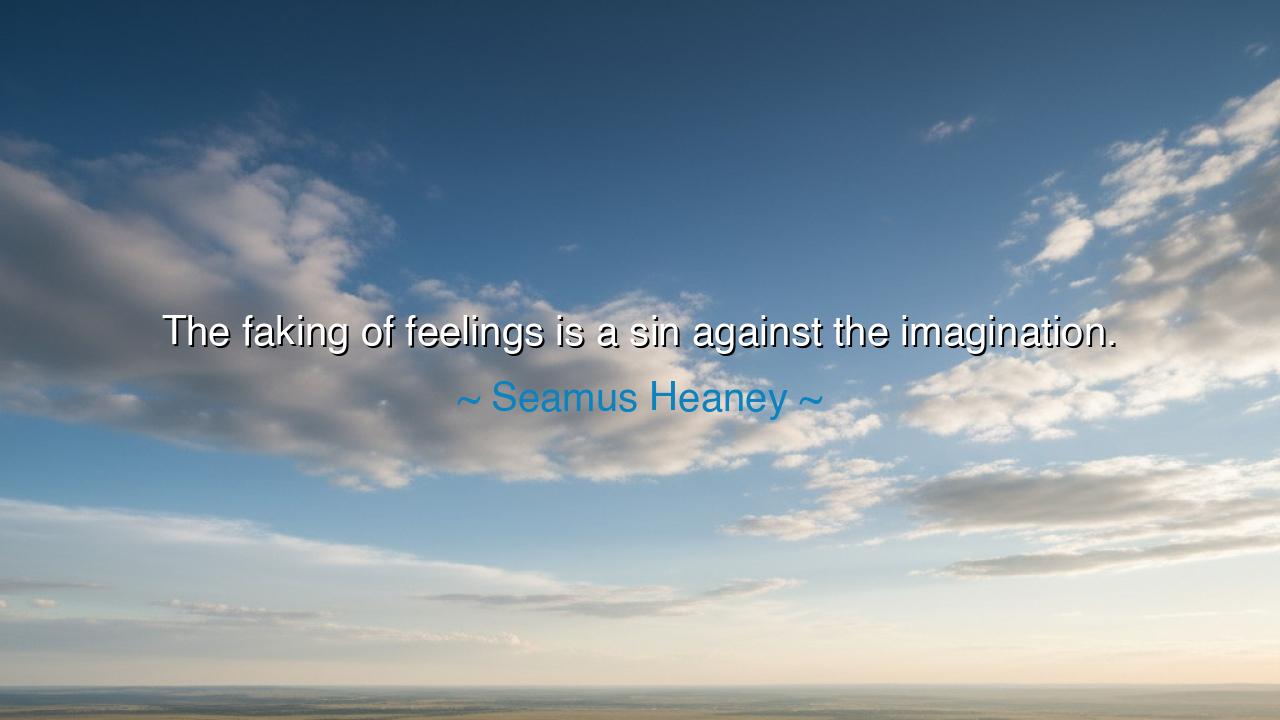
The faking of feelings is a sin against the imagination.






“The faking of feelings is a sin against the imagination.” — thus spoke Seamus Heaney, the poet of Ireland’s soul, whose words flow like rain over the fertile ground of human truth. In this brief but thunderous declaration, Heaney reveals the sacred bond between authentic emotion and imagination, and warns against the corruption that arises when that bond is broken. To him, poetry — and by extension, all human expression — must arise from what is genuine within the heart. To pretend emotion, to craft art or speech without sincerity, is not merely a lie; it is, as he says, a sin against the imagination — a desecration of the divine force that gives life to both art and spirit.
To understand his meaning, we must first understand what the imagination is. It is not fantasy, nor is it mere invention. It is the inner faculty that perceives truth beyond appearance — the flame that transforms sorrow into song, and love into language. The imagination is nourished by authenticity; it draws power from the real feelings that move the human heart. When those feelings are faked — when one feigns joy, sorrow, or wonder for the sake of appearance or praise — the imagination withers, for it cannot live on falsehood. As the ancients taught, the Muses bless only the honest soul, not the performer who mimics passion without possessing it.
Heaney’s words also arise from the soil of his own life — a man shaped by the divided heart of Ireland, where faith, politics, and history collided in endless tension. His poetry often sought to reconcile the brutal and the beautiful, to find truth amid conflict. In such a world, faking feelings was a luxury he could not afford. For in a land soaked in both blood and memory, sincerity became the only form of honor. He knew that imagination is not escapism — it is vision, born from the deepest engagement with reality. To betray one’s own feelings, or to counterfeit them for acceptance or acclaim, is to betray that vision.
Consider the example of Vincent van Gogh, who poured the anguish and wonder of his soul onto every canvas. His brush did not flatter, nor did it disguise; it revealed. Each stroke was an act of truth, often painful, often radiant. Had he chosen to paint with calculation instead of feeling — to imitate what others admired rather than express what burned within him — his art would have been technically fine, but spiritually dead. It was his honesty of emotion that transformed paint into revelation. Thus, van Gogh, though rejected in his lifetime, became immortal — while countless imitators faded into silence.
Heaney’s warning is not only for artists but for all who live. The world today tempts us constantly to counterfeit our emotions — to display joy we do not feel, to simulate empathy, to hide our wounds behind polished masks. Yet every such falsehood numbs the soul and dulls the imagination. For imagination thrives not on perfection, but on truth — even when that truth is painful. To fake feeling is to cut oneself off from the sacred well of creativity, to silence the voice that might have spoken something eternal.
In the ancient wisdom of poets and prophets, truth of heart has always been the first virtue. The imagination is a sacred instrument, a harp strung with the strings of emotion. When one pretends to feel, the notes fall flat, the melody dies. But when one dares to feel honestly — to grieve, to rage, to love — the imagination sings, and through that song, both artist and audience are healed. The truest creations of humanity — from music to philosophy, from art to compassion — arise not from skill alone, but from the courage to be sincere.
The lesson of Seamus Heaney’s words, then, is both moral and practical: never fake what the heart does not truly hold. Whether you speak, write, or act, let your feelings be real. Do not adorn them, do not disguise them, do not force them into the shapes that others expect. For the imagination is a living spirit that dwells only in truth. It will reward honesty with beauty, and sincerity with vision.
So, my children of words and thought, remember this: to live truthfully is to create powerfully. Guard your imagination by honoring your feelings. Do not pretend to love when you do not; do not feign sorrow when you are numb. Speak as the heart commands, even if it trembles. For in every true feeling lies a seed of creation — and when the imagination drinks from that pure source, it will bear fruit that endures beyond your lifetime. To fake emotion is to build a shadow; but to feel truly is to summon light.






AAdministratorAdministrator
Welcome, honored guests. Please leave a comment, we will respond soon